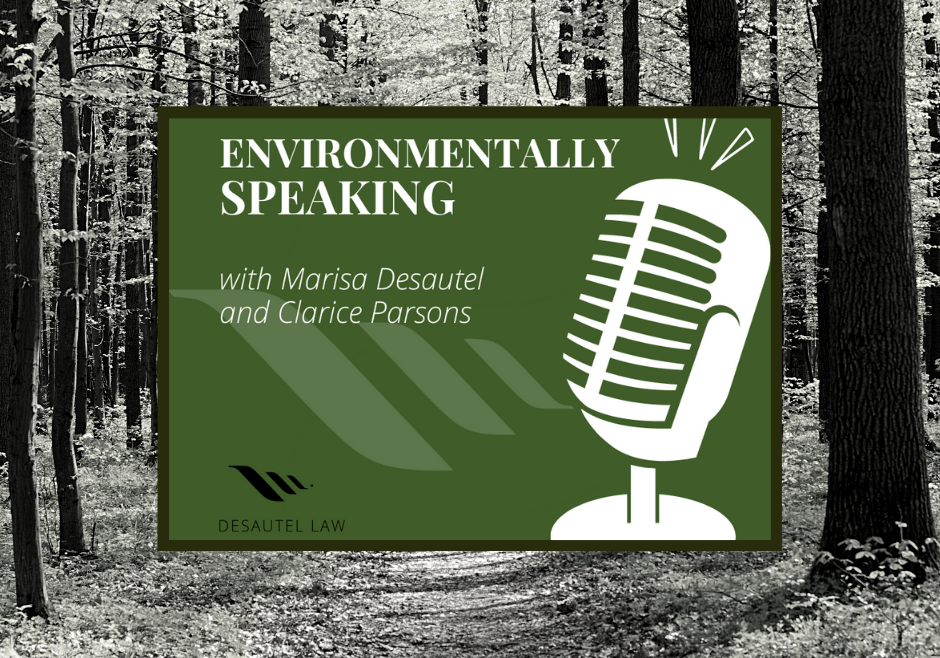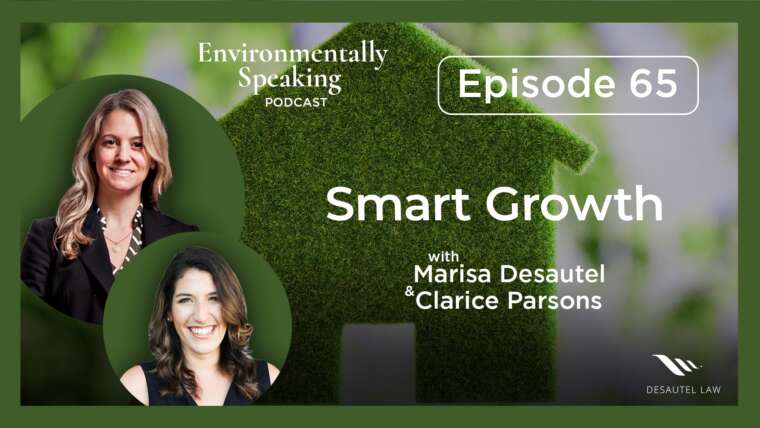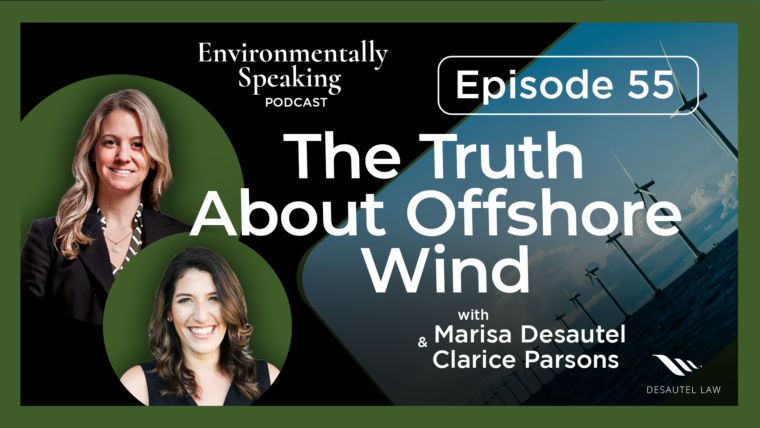In this episode of Environmentally Speaking, Marisa and Clarice share their experiences in law school, and recommendations on how to navigate the niche legal path of environmental law and litigation.
LISTEN NOW:
EP 013 – Becoming and Environmental Attorney: What to Consider
CLARICE: Hello. Good morning, everybody.
MARISA: Good morning, Clarice.
CLARICE: I was doing so well not to laugh. I was going to address the blind public and not laugh and then you got me. You threw me off.
MARISA: No. I have to say that I think – listen, we don’t know what we’re doing. We’re new to this podcast thing. But I think what sets us apart is the fact that we laugh a lot. I don’t think that’s typical. The podcasts that I think you listen to and I listen to have more to do with like homicide and –
CLARICE: Yeah.
MARISA: — cold cases.
CLARICE: Yeah.
MARISA: There’s no laughter. Anyway.
CLARICE: No. We like a good dark podcast.
MARISA: True. But this is not a dark podcast. This is Environmentally Speaking. I’m Marisa Desautel an attorney with a few decades of experience.
CLARICE: And I’m Clarice coming with your questions, topics, and, you know, things to discuss. And today we decided to shift gears a little bit, lighten it up, keep with the laughter. We are going to talk about what to expect if becoming an environmental attorney is something you’d like to do.
MARISA: Yeah. And I have to preface this by saying that the experience of becoming an attorney in general is relevant to what we’re going to talk about today, but being an environmental attorney is a pretty niche practice especially here in Rhode Island. The environmental bar is pretty small. There’s not a lot of us that are doing it, so.
CLARICE: I think there’s three of you. Let’s be very honest. There’s probably like three of you.
MARISA: I think there’s a few more than three but not a whole lot more.
CLARICE: Well, the good news is you really know your opposing counsel.
MARISA: That’s true. So you went to law school, too, right?
CLARICE: I did. I did. I went to New England Law of Boston.
MARISA: How was that?
CLARICE: It was as good as law school can be is how I say it.
MARISA: Yeah.
CLARICE: I made it through to the other side. I made some good friends at the end of it, learned some things. Ten out of ten, would not do again.
MARISA: Yeah. I know. And you talk to attorneys now that have been practicing for a little while and they say the same thing. Like why did I do this.
CLARICE: Yeah.
MARISA: But I have to stay on balance. I enjoy practicing in Rhode Island. The attorneys here are – at least the environmental attorneys that I can speak on behalf of are great to work with. And the state agencies that regulate environmental issues are also really wonderful to have as clients. So I would say if you’re looking to do the environmental law thing, dedicated some of your time and experience to state government or federal government is a really noble cause and you learn a ton. You build your resume. You build a network. And if you are pro environment like we are, it’s a really rewarding place to go every day.
[0:03:12] CLARICE: I will say talking with, you know, the people that we’re frequently reaching out to with the different state agencies like DEM, CRMC, and those people that we have to make a lot of outreach to, I will say they do take the time to know your name. They remember what firm you’re calling from. They are some wonderful people to work with even if you are on kind of opposing sides of [inaudible]. There’s definitely a warmth and a cooperation there.
MARISA: Yeah. And everyone really cares. That’s the thing about practicing in environmental law. It’s a very specific area that you have to have a passion for to want to spend your time doing. There’s other areas of law that I’m sure people are passionate about, but for me the environment and the planet and our natural resources have always been paramount. I’ve dedicated my whole life to the cause. So it’s been tough at times. You know, going to law school was not the easiest as you know, Clarice. Some of the classes are humiliating. So for folks that are interested in becoming an attorney, I’d say just put your head down and get through it because it’s a means to an end. And how you do in law school is not indicative of how you’re going to be as an attorney, right. I mean, has that been your experience, too?
CLARICE: No. Yeah. I mean, some of the kids who graduated top of the class are now doing something completely outside of law. Some kids that were in the middle of the pack are now, you know, being honored in our alumni magazine for their incredible work. So I think more than anything –
MARISA: You just never know.
CLARICE: — once you’ve completed law school your dedication and your hard work becomes what you get graded on more so than how fast can you remember the facts.
MARISA: Yeah.
CLARICE: So if we’re talking about becoming an environmental attorney and what to expect, were there things that you did in law school that started you on that track? Were there things that you did to prepare for law school to go down the environmental track?
MARISA: I didn’t know that I wanted to be an attorney until I had been working as an environmental scientists and consultant after college. I did that for about four years in Boston and Providence and decided that I wanted to do more to be an advocate for the environment. So I gave it some thought and did a little research and just on a whim took the LSAT and said, well, I guess I’ll see if I’m any good at this. And I did okay and then kind of just waded in and said, I don’t know much about being an environmental lawyer, but it seems like they have a lot of ability to advocate and make change through case law. So that was very appealing to me.
And I took the LSAT, applied to Roger Williams. They had an excellent – or they still do have an excellent marine affairs program in conjunction with the University of Rhode Islanded. So if you get accepted into that program, you go to law school, but you also take classes at URI simultaneously and you graduate with your juris doctor in law and a master’s degree in marine affairs. I’m pretty sure that they have other master’s programs, too, at Roger Williams. Off the top of my head I’m not sure what they are.
But going to URI for the master’s was a great opportunity because they’re doing a ton of coastal science and coastal policy work, so I met a lot of the people that I do business with today at URI. So that was my track, but everyone’s different. I mean, Vermont Law School has a great environmental studies program. I’ve talked to students that didn’t know they wanted to do environmental law until they got into more policy and political work and figured out that being a lawyer was a good way to change law to become senate counsel or to otherwise get involved with politics in a legal capacity. So that’s an option, too.
[0:07:31] CLARICE: I think one thing that’s important to note especially with the environmental law field is you’re going to want to have something in your undergrad or something in a master’s program that does deal with the environmental sciences. And I know that sounds so obvious, but there’s so much of the work that you’re going to be doing as an environmental attorney that is really technical. It is dealing with different chemicals and different units of measurements and, you know, test results from a clean air study or a clean water study.
And that specialized information that you receive in undergrad or with a master’s program is really going to help you read the papers that your clients give you or read the filings from an agency. I did not do the environment attorney track and a lot of times when I received these documents there was so much extra learning that I had to do that you’re going to want and you’re going to need in your toolbelt.
MARISA: Yeah. Good point. Yeah. And it’s also really helpful if you’re litigating an environmental matter to have to cross-examine or depose an expert if you have at least a foundation of understanding of the science behind the data and analysis. It makes it easier to get the information that you need from the opposing party’s expert and your own expert. So that’s another reason I agree with you.
CLARICE: Yeah. Like you’re going to save a little bit of money knowing that you don’t always need to call in an expert to read the documents you receive and explain them to you.
MARISA: No.
CLARICE: You know, just having that baseline kind of helps you be able to sit at that table and be involved.
MARISA: Yeah. Totally.
CLARICE: So other than having that specialized knowledge and looking to see if there are additional tracks within your law school or within your undergrad that can help prepare you, are there things that a practicing environment – are there things that are unique for a practicing environmental attorney that maybe a general practice litigator or just kind of, you know, when we think of like your general attorney that they don’t have to do that you do?
MARISA: Yes. And I would caution against – it’s like tax law or Workers’ Compensation. I would never try to figure that out, right. I mean, it requires years and years of studying the material, working on the material hopefully with a good mentor that can point things out to you along the way. It’s not something that I would recommend diving into, although I’m sure there are some geniuses out there that can do that, but I’m not a genius. And so I got where I am just by hard work and not giving up. Hopefully if you have those God-given talents you can rely on those.
But, for example, there was a story I heard when I was working for the Department of Environmental Management. Another attorney told me the story that he was working on a federal case in litigation and he was the Plaintiff, I believe. And the Federal Environmental Protection Agency was a co-Plaintiff and they brought in a couple of attorneys that were working with the EPA. The case was about the Clean Water Act and it was a violation that both the state and the federal government issues and then tried to enforce in federal court because the Defendants were pretty calcitrant and nonresponsive.
And this attorney told me that he thought he was pretty well prepared for oral arguments and had studied and researched and put together all the pleadings. And these attorneys come in from the EPA and these people had been practicing environmental law for, I don’t know, let’s say 20 years, 25 years. There were three of them. Each attorney was dedicated to only one sentence in a particular provision of the Clean Water Act. That’s how comprehensive the case law and the secondary source research is for certain federal environmental statutes.
One attorney spoke on one sentence. So there were three sentences that were being litigated and they each had 15 minutes to speak on the sentence. So that’s the level of detail and nuance that you can get into with some of these federal statutes. And that’s why I say don’t think you can just jump in and head to court and figure it out because there’s always going to be someone that knows more than you do.
[0:12:24] CLARICE: On the flip side of that, if there is something that you’re super passionate about and something that you really do want to niche down into, it also shows that there’s a space for that. Taking on the whole big umbrella topic is a lot and unless you’re a savant, maybe don’t. But also it welcomes if clean water in Gansett Bay is your joy, is your dream, there’s space for it.
MARISA: Well, look at you being all positive.
CLARICE: Dude, I got to try. It’s Friday morning. Nothing can take me down.
MARISA: It makes me very uncomfortable. Can we go back to the negativity?
CLARICE: Okay. So back to the homicide I was just listening to.
MARISA: Great. Great. Well, you know, it is Friday and I think on that note, on a positive note, let’s wrap it up here. We do have an internship program that is available to law students. If you feel like you want to learn more about it or you want to talk to one of us about how that program goes feel free to reach out. But it starts in April and goes through the summer for law students.
CLARICE: And it’s always a great opportunity toot see what environmental law looks like day to day, see what you’re researching, see what that looks like.
MARISA: Yeah. Whether you’re going to like it.
CLARICE: Exactly. It’s kind of the first date into if you want to be an environmental attorney. There’s not a lot of commitment. You get to try it out, see how you feel, but you’re not necessarily dedicating a drawer or swapping keys.
MARISA: Yeah.
CLARICE: All right. If you are interested in our intern program –
MARISA: Oh, and didn’t you do a podcast with one of our previous interns?
CLARICE: Yes. Yes. I believe it’s episode five. You get to hear Karen’s perspective. She was a joy to have. She was wonderful.
MARISA: Yeah. She was delightful.
CLARICE: Yeah.
MARISA: So nice. We’re cross-referencing now. Anyway. That’s it. That’s all I have.
CLARICE: So if you have any questions, comments, things that you want to hear about, any follow-ups you’d like, or if you want to learn more about our intern program shoot us an e-mail at Help@DesautelESQ.com. Also follow us on Instagram. Send us your thoughts. Comment our photos. I believe we do furry Fridays now where we highlight some sort of adorable wilderness animal, some wildlife. Yeah. And we will talk to you soon. Bye.
MARISA: Thanks, everybody.




